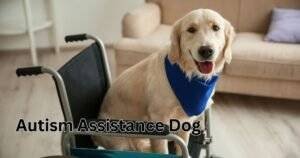Choosing to adopt a dog is a huge step that comes with a lot of responsibility and love. Many first-time dog owners have lots of questions and lots of excitement before they bring their new furry family member home. One common concern is whether or not dog owners should consider adopting an older dog as their first pet.
Dogs come in many shapes and sizes, from adorable pups to seasoned seniors. Even though adopting a puppy can be a rewarding experience, elderly dogs are often disregarded despite the particular benefits they provide. This article will discuss the benefits of adopting a senior dog for the first time.
Discover the benefits of adopting an older dog, learn about the challenges they may provide, get tips on how to be ready for the adoption process, and find out what it takes to provide a senior dog with a happy and healthy retirement. If this is your first dog, you should finish this post with a better idea of whether or not it’s a good idea to acquire an older dog.
Senior dogs
Before discussing the pros and cons of adopting an older dog, it’s important to define what we mean by “senior dogs.” This can be a bit of a challenge because the definition can shift depending on factors like breed and size, but as a rule of thumb, senior dogs are those that are seven years old or older.
But it’s important to remember that age alone isn’t a reliable indicator of a dog’s health. The onset of old age in a dog can be affected by several factors, including breed, genetics, and general health. Larger dog breeds may be considered seniors as early as 6 or 7 years of age, whereas smaller dog breeds may not be deemed seniors until closer to 10 years of age due to their longer lifespans.
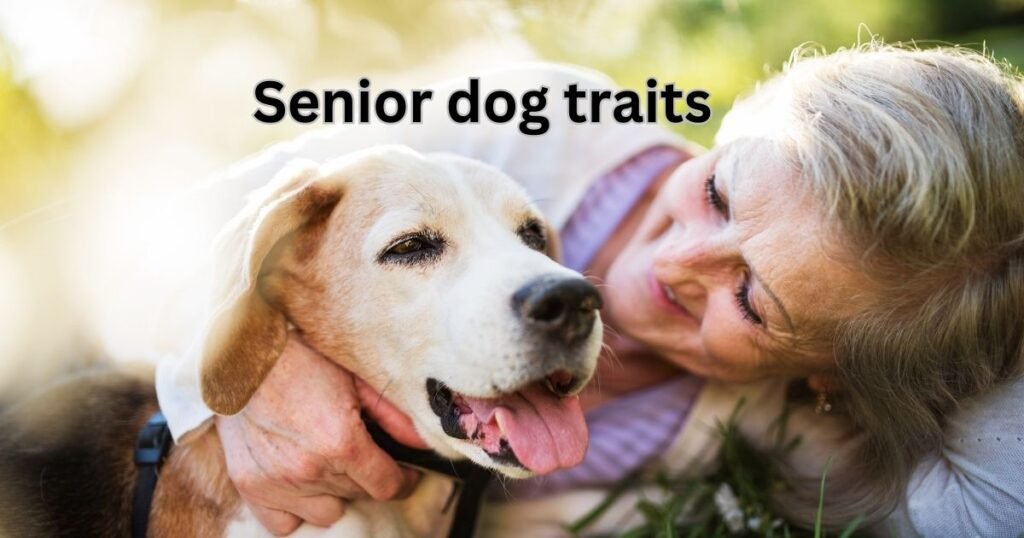
Senior dog traits:
Lowered Vitality
Dogs in their senior years are typically less energetic than their younger canine colleagues. They might not have the unlimited energy of a puppy anymore, but they still love going for walks and playing.
Adapting Healthcare Demands
Aging dogs are susceptible to a host of age-related health concerns, including arthritis, dental disorders, and even vision and hearing loss. The value of routine veterinarian exams is crucial.
Consistent Personality Traits
The behavior and suitability of a senior dog to your family can usually be predicted with greater accuracy than that of a younger dog. They have set personalities that are less likely to change at this age.
Reduced Need for grooming
Grooming requirements for pups and adult dogs are typically higher than those for older canines of the same breed. Older dogs shed less and have less requirement for frequent bathing.
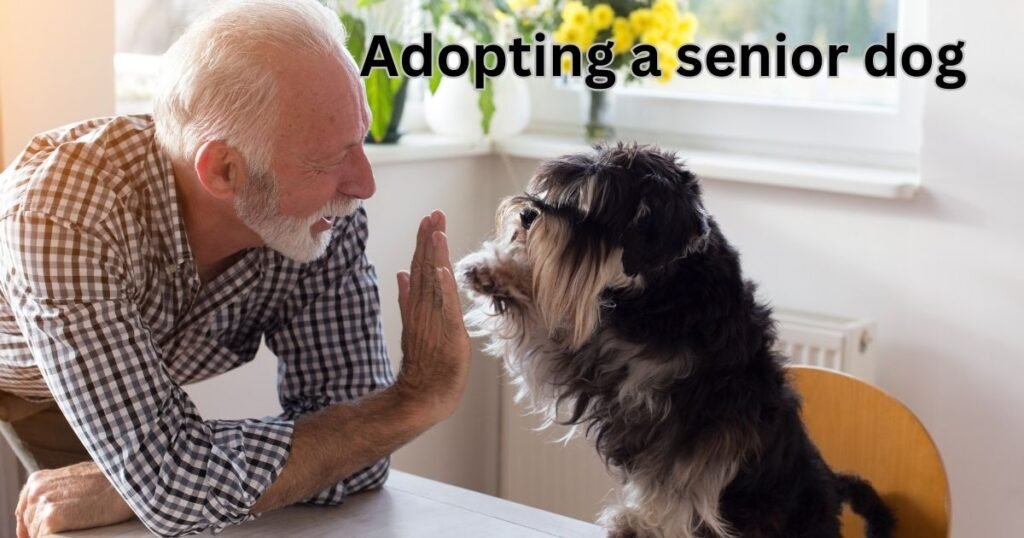
Knowledge and Age
Older dogs have seen and done a lot, so they tend to exude wisdom and serenity. They make for great friends since they have been through a lot before they have been adopted by you. If you are a first-time dog guardian, going for an elderly dog is a good option.
Benefits of getting a senior dog
Numerous positive outcomes are associated with adopting an older dog, making it a gratifying experience for both you and your new best friend. Some major benefits of adopting an older dog include:
Consistent Personality Traits
You may trust a senior dog because of his or her established personality. They have completely formed personalities, making it simpler to locate a pet whose temperament suits your needs.
Lower levels of destruction and training
Most elderly dogs have learned basic obedience and are housebroken. When compared to the time and energy needed to teach a puppy, this can be a significant time saver. In addition, most adults in their latter years will have finished their phase of teething and chewing. The likelihood of harmful activities like digging, excessive barking, or gnawing on furniture is reduced.
Quick attachment with guardians
Adopting a senior dog is a great way to give a dog a second chance at finding a forever home, as they are often ignored at shelters. They develop strong attachments to their new caretakers and are quite appreciative of the company.
Low Maintenance and Good Behaviour
In general, senior dogs are less needy than puppies and may get by without continual monitoring. They prefer company to isolation and won’t bother you as much if you just hang out with them. Senior dogs are frequently well-adjusted and accustomed to family life, making them excellent candidates for adoption. Even the adoption fee is lower in the case of senior dogs.
Provide a second chance
Adopting a senior dog is a wonderful way to give a dog in its golden years the care and attention it deserves. The benefits of this noble deed can be life-changing. This is the best way to honor everything our furry friends have done for us. The attachment between a senior dog and its owner is frequently quite close and deeply felt. They are devoted to their owners and respond enthusiastically to displays of affection.
Points to Take into Account as New Guardian of a Senior Dog
Adopting a senior dog can be a rewarding and caring experience for the new canine caretaker. However, there are a few things you must keep in mind to make the transition go well and give the greatest care for your senior dog:
Health history and Evaluation
Get your older dog in for a full check-up at the vet as soon as possible. This will aid in determining whether or not any pre-existing health conditions need to be treated or managed. Collect information about the dog’s current and past medical issues, as well as any medications or treatments it is getting.
Attention to Detail
Age-related health conditions, such as arthritis, dental problems, visual or hearing loss, and cognitive decline, are possible and should be anticipated. You and your vet should talk about your worries and come up with a plan for how to treat them.
Physical activity and healthy eating
To find out what kind of food is best for your senior dog, talk to your vet. Some older dogs have unique nutritional requirements and should be fed senior dog food or given nutritional supplements. Senior dogs may have less energy, but they still need moderate exercise to maintain their physical and mental health. Change the exercises to accommodate their level of fitness and any mobility issues they may have.
Comfort and grooming
Your elderly dog may benefit from orthopedic bedding, ramps or stairs for accessing higher surfaces, and non-slip flooring. Place the bedding in an area where your dog has plenty of room to move about. Brushing to prevent matting and regular nail trims may be necessary for senior dogs. Take care of their skin and fur.
Medical and dental attention
Medications and nutrients for your older dog should be given precisely as indicated. Be aware of your medication’s schedule and any possible adverse reactions. Older dogs especially need to have good dental hygiene. Visits to the dentist for checkups and cleanings should be scheduled routinely. Home dental care for dogs includes brushing and the use of dental chews or toys.
The Challenge of Finding the Right Senior Dog
Careful thought and organization are required to locate a senior dog that is suitable for your way of life. Here are some suggestions for finding and adopting a senior dog that fits your lifestyle:
Think About Your Way of Life
It’s important to take stock of your current situation and consider how much time, energy, and love you can provide a senior dog before you begin your search. Think about things like how you spend your time daily, where you live, with whom you live, and the dynamics of your family.
Figure Out What You Want
Think about what kind of senior dog you’d like to adopt, and what size, breed, or mix of breeds, age, and personality traits are most important to you. Consider whether you’d rather spend time together being active or relaxing.
Research
Look for senior-specific rescue groups, animal shelters, and general rescue organizations in your area. Some organizations focus specifically on finding good homes for elderly dogs, but there are always dogs of all ages ready for adoption at shelters. Go to senior dog adoption events and shelters to meet them in person. Get to know them and see if their personalities and ways of life mesh with your own.
Inquire
Inquire about senior pets up for adoption when visiting shelters or contacting rescue groups. Find out about their health, personality, where they’ve lived before, and whether they have any particular wants or needs.
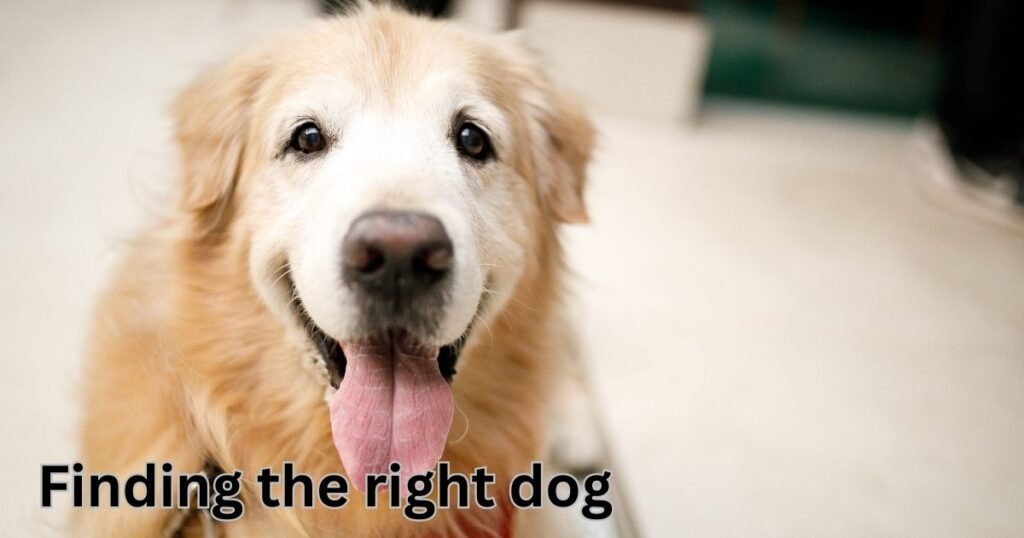
Get Acquainted
Set up a meeting if you come across a senior dog that could work for your family. You can spend more time with the dog in a safe setting before deciding if you’re a good fit for each other.
Foster-to-Adopt
Foster care with the option to adopt should be explored. Before making a long-term commitment to the older dog, you can provide it with temporary foster care. It’s a terrific tool for making sure everyone gets along before an adoption. Request a home visit from the shelter or rescue group to see how the senior dog does in your environment.
Talk to volunteers
Consult with people who have experience caring for senior dogs, such as those working at shelters or in rescue organizations. Insights into the dog’s personality, needs, and background can be gleaned from these records.
Consult Your Vet
Before adopting an older dog, it’s important to discuss the decision with your vet. Get up to speed on any immunizations or medical requirements, as well as any potential health problems.
Is everything matching up?
Make sure the senior dog’s temperament, energy level, and requirements fit in with your home and family. Think about how well they’d get along with your kids and other pets, as well as how they’d fit into your routine.
Stay in touch with rescuers
As your senior dog adjusts to their new home, it is important to keep in touch with the shelter or rescue organization from which they came. Maintain giving them the attention and care they require to flourish.
Medical and health-related considerations
When adopting an older dog, it’s important to put the animal’s health and well-being first to make sure they enjoys their golden years to the fullest. When adopting an older dog, it’s important to keep in mind the following health and medical factors.
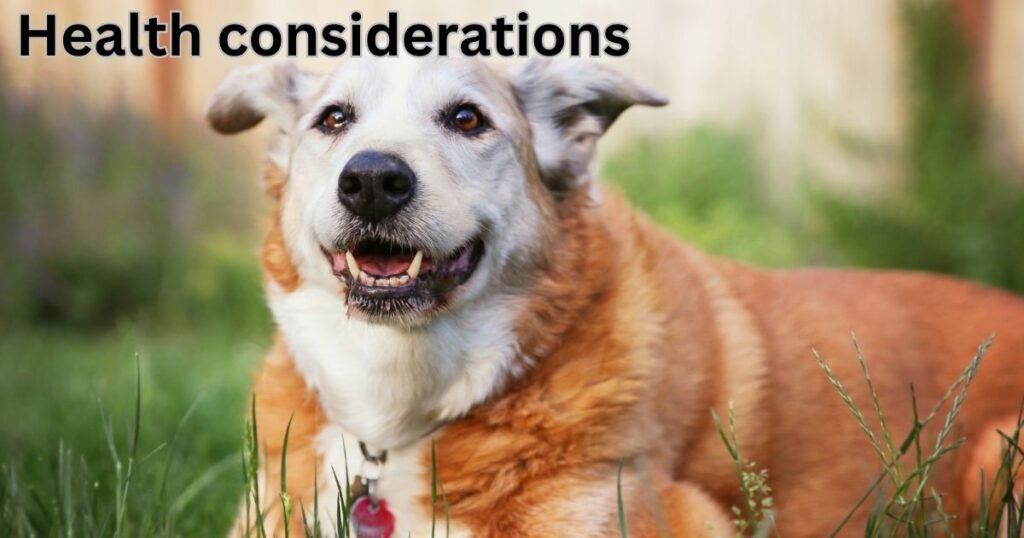
Immediate Veterinarian Exam and vaccinations
As soon as you can after adopting an older dog, take him in for a full checkup at the vet. This will help determine their current health status and reveal any potential health problems. Keep your senior dog up-to-date on all of its immunizations and preventative medications, such as those for heartworms, fleas, ticks, and intestinal parasites. Talk to your vet about setting up a vaccine program.
Hearing, sight, and dental hygiene
Older dogs frequently experience dental problems. Your dog’s comfort and health may depend on regular dental examinations and cleanings to prevent and treat tooth disease. Keep an eye on your dog’s hearing and vision as it gets older. Talk to your veterinarian about any problems or changes you’ve seen.
Mobility issues
Older dogs often experience issues with their joints, such as arthritis. Talk to your vet about medications, nutrients, weight management, and physical therapy that can help with pain management and mobility.
Diet
Consult your vet to figure out what kind of food is best for your older dog. To help with age-related issues, your vet may suggest a senior dog food or nutritional supplements.
Exercise
Keep your elderly dog at a manageable weight. Age-related health problems can be made worse by obesity, which can also lower the quality of life. Low-impact, moderate-intensity exercise is ideal for senior dogs since it helps them keep their muscular mass and mobility. Create an activity plan that works with your dog’s strengths and limits.
Mental Exercises
Keep your elderly dog’s mind engaged by giving it some cerebral exercises. Cognitive decline can be halted with the use of puzzle toys, interactive games, and consistent social connection.
End-of-life care
Maintain consistent evaluations of your older dog’s well-being. Pay attention to cues indicating distress and make choices that put their happiness first. Discuss all of your options for end-of-life care with your veterinarian, including pain relief, hospice, and euthanasia.
Getting ready for an older dog
To guarantee a stress-free introduction for you and your new furry friend, it’s important to plan for an older dog. To help you get ready to adopt an older dog, here is a step-by-step guide:
- Remove potential dangers, put away any poisonous materials, and make any necessary alterations to make your home safe for your new puppy or senior dog.
- Get the basics like food, water bowls, a cozy bed, grooming tools, some fun toys, and a leash.
- Establish a safe haven in your home where your senior dog can relax. It could be a crate, a comfy nook, or a bed.
- Take into account your senior dog’s unique needs and physical limitations while planning an exercise schedule. In most cases, strolls and low-impact exercises are the best bet.
- You should take care of your teeth, groom yourself regularly, and keep an eye out for signs of aging.
- Have patience with your senior dog while he or she adjusts to a new home or neighborhood. Show them kindness, understanding, and tolerance.
- Provide your senior dog with lots of loving company and care. Many older dogs develop deep attachments to their humans and like being in your company.
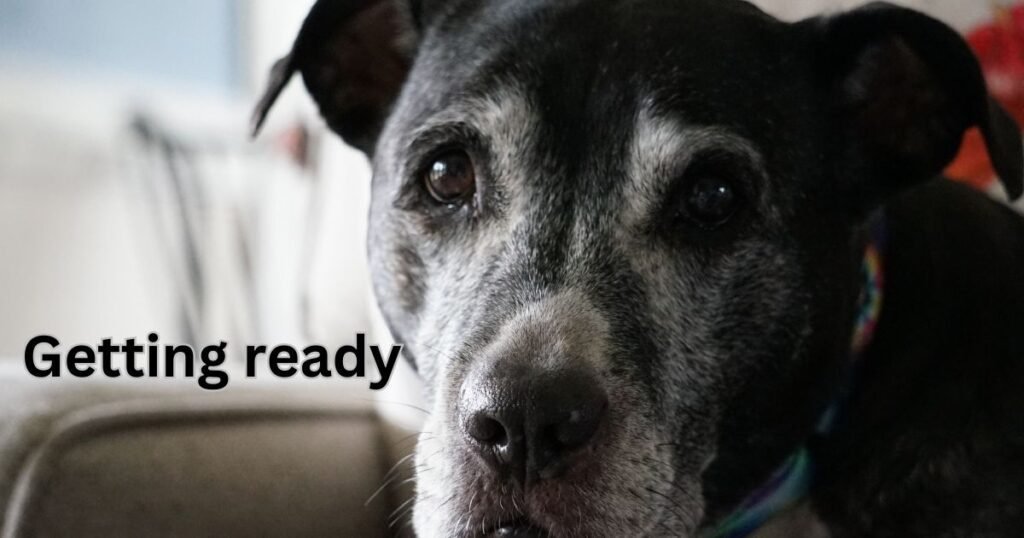
Choosing and meeting a senior dog
Meeting an aging dog for the first time is a thrilling but serious experience. Follow this detailed approach to make an educated choice and make a good first impression:
Decide beforehand
Make a decision on the ideal size, breed (or mix of breeds), and age range for your senior dog. Think about what kind of personality and degree of activity you’re looking for. Find out more about senior rescue groups, animal shelters, and general rescue organizations in your area. Check out their animal care and adoption procedures to ensure they meet your standards.
Get Acquainted
Meet up with a senior dog you’re considering adopting. You can spend more time with the dog in a safe setting before deciding if you’re a good fit for each other. Observe the dog’s demeanor as you get to know it. Examine their demeanor for indications of friendliness, fear, hostility, or any other personality traits that could make them unsuitable for your home.
Inquire About Past Health
Find out if the dog has been vaccinated, if it has had any recent medical attention, and if it has any known health issues. Knowing their health state is crucial for caring for them effectively.
Are they right for your family?
Before bringing an aged dog into your home, be sure its temperament, energy level, and individual needs are suitable for your family. Think about how well they’d get along with your kids and other pets, as well as how they’d fit into your routine.
Temperament
Find out the dog’s background in training and how it acts around people. Positive and negative habits, respectively, may have already been established by an older dog. Identify the need for any alterations in training or behavior.
Transitioning and training
Training and a smooth transition are essential when adopting an older dog. They have already had plenty of experiences both good and bad in their lifetime. As you plan to adopt a senior dog, you must focus a lot on ensuring a smooth transition.
Change Over Time
Realize that an aging dog may experience some anxiety throughout the settling-in process. Start by only letting them inside one or two rooms to ease them into their new home. As they get used to things, you can start letting them explore more of the house.

Ensure the feeling of security
Make sure your senior dog has a safe, pleasant place to rest. It could be a crate, a comfy nook, or a bed. Set a regular schedule for eating, exercising, taking breaks, and going to sleep. Your senior dog will feel more at ease and secure with your consistent treatment.
Housebreaking and leash-training
Be patient and persistent when you teach your senior dog how to walk on a leash if he or she has never learned. Good behavior when on a leash should be rewarded with positive reinforcement. Even though an older dog may already know how to use the bathroom outside, it’s important to refresh that knowledge in a new setting. Encourage them to use the outdoor facilities and reward them for doing so.
Socialization
Introduce new experiences, people, and pets to your senior dog slowly and safely to help him adjust. Find out if the dog likes people and other animals. If your dog is afraid of people, it may be because of a negative experience. His anxiety can be alleviated by engaging in social activities that you enjoy but he doesn’t. So take it slow and steady.
Basic training
Positive reinforcement training methods are useful for teaching older dogs fundamental commands. Start with the most basic ones of them like “sit,” “stay,” and “come.” Use positive reinforcement strategies like rewards, compliments, and affection to encourage good behavior. Training approaches that are positive and non-threatening are most effective with senior dogs.
Deal with Behavioral Problems
Consult a dog trainer or behaviorist if your senior dog has problems behaving or behaviors that need changing. As I mentioned before, bad behavior may sprout from negative experiences in the past. Thus, a behaviorist or trainer can provide you with advice specific to your dog.
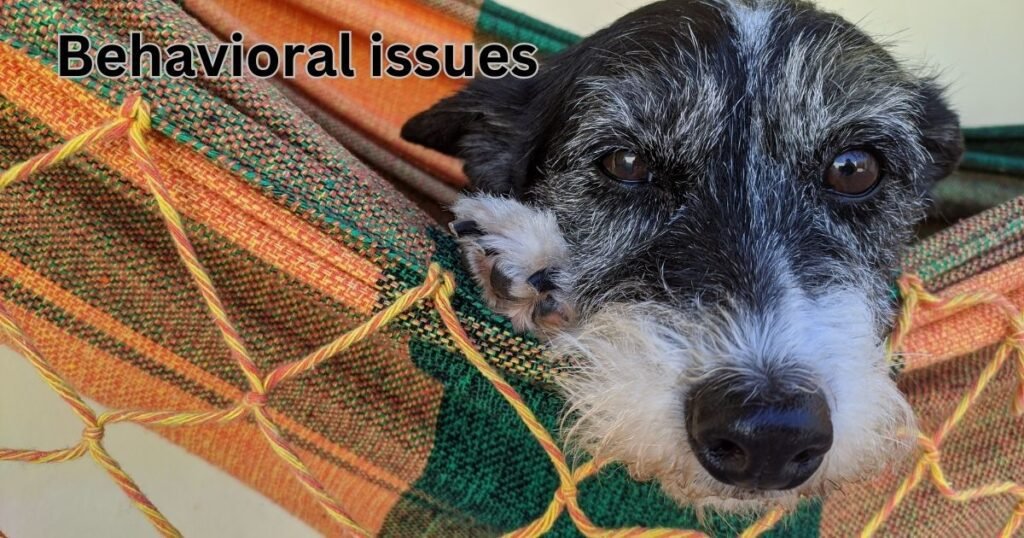
Choosing an End-of-Life Care Plan
The decision of how to provide end-of-life care for your senior dog is a difficult but crucial one. Here are some guidelines to help you decide what’s best for your dog:
Get in Touch with Your Vet
Beginning with a discussion with your veterinarian is recommended. They will be able to examine your dog and provide you with advice on how to handle age-related health problems. The knowledge and advice of your veterinarian will be invaluable.
Understanding the Condition of Your Dog
Learn all you can about the health problems your dog is experiencing, whether they are long-term or short-term, physical or mental. Having this data at hand is essential for selecting the right degree of care.
Evaluation of Quality of Life
Maintain a consistent evaluation of your dog’s well-being. Things like soreness, stiffness, mobility, appetite, interest in activities, and contentment should all be taken into account. Document your progress in a journal.
Pain treatment
If your dog is in discomfort, you should consult your vet about pain relief options. Sometimes medication or alternative therapies can help.
Palliative Care
Your dog’s quality of life in its final days, weeks, or months is the primary emphasis of hospice care. In either case, your veterinarian will be able to advise you on the best course of action.
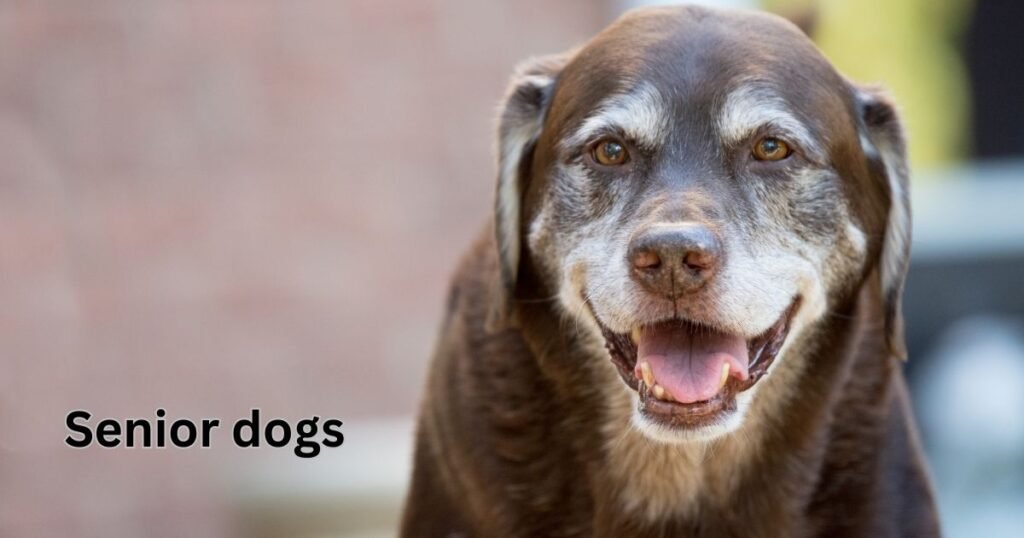
Euthanasia
When your dog’s quality of life declines to the point that they are suffering and there is little chance for improvement, euthanasia is a humane and compassionate alternative. Talk to your vet about the process and your alternatives, including home euthanasia. It can be difficult to sort through your feelings about euthanasia and decide whether the time is appropriate. Determine the criteria for making this choice after consulting with your veterinarian. Don’t doubt yourself or your vet’s advice.
Ensure a comfortable Ambience
Create a relaxing atmosphere for your dog. Make sure they have food, water, and company, and provide them with a comfortable place to sleep. Get some help dealing with your emotions during this trying time. Talk about how you’re feeling with someone who can help you process your emotions, such as a close friend, family member, or therapist.
Conclusion
In conclusion, yes, getting a senior dog for first-time dog guardians can be a very rewarding experience. It can teach you the ropes and allow you to ease into the process of dog care. Taking care of an older dog is an adventure that is both fulfilling and demanding, requiring plenty of love, patience, and thoughtfulness. Having brought home a senior dog, you must make sure their golden years are as good as they can be.
Moreover, being a responsible and empathetic canine caregiver includes making decisions about end-of-life care, which can be emotionally taxing. Your veterinarian can advise you on how to best care for your dog in his or her final days, whether that means administering pain medication, arranging for hospice care, or making the difficult decision to euthanize.
Keep in mind that the health and happiness of your senior dog depends on you. Treasure the time you have together, be a kind and supportive companion, and do everything in your power to ensure the highest quality of care is provided. Your relationship with your senior dog is a monument to the everlasting love and loyalty shared between humans and their animal partners.
Frequently Asked Questions
Why should I consider adopting a senior dog instead of a puppy?
There are several advantages to adopting an older dog, such as the chance to provide a dog a loving home, a dog with a more settled personality, and reduced activity levels.
What health considerations should I keep in mind when adopting a senior dog?
It is crucial to inquire about the medical history, possible current treatments, and medications of older dogs because they may have particular health needs. It is essential for their health to have regular checkups with the vet.
How do I help a senior dog adjust to a new home?
It is crucial to be patient and to gradually introduce them to their new surroundings. Give them a place to relax, set them up with a schedule, and introduce them to mild socializing. Show empathy if you suspect that someone is experiencing anxiety or adjustment difficulties.
What type of exercise and activity is suitable for a senior dog?
Gentle, frequent exercise helps older dogs stay mobile and mentally stimulated, even if they may not need strenuous activity anymore. It is sometimes best to have brief moments of rest, engaging play, and short walks.
Are there adoption programs or incentives for senior dog adoptions?
Adoption fees or special programs may be available for older dogs at certain shelters and rescue groups. Before bringing a senior dog into your house, find out what incentives and services are available.











